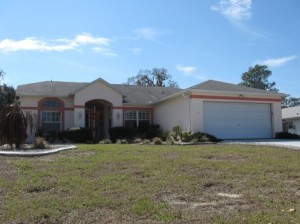SPRING HILL — Charlie and Maria Cardoso are among the millions of Americans who have experienced the misery and embarrassment that come with home foreclosure.
Just one problem: The Massachusetts couple paid for their future retirement home in Spring Hill with cash in 2005, five years before agents for Bank of America seized the house, removed belongings and changed the locks on the doors, according to a lawsuit the couple have filed in federal court.
Early last month, Charlie Cardoso had to drive to Florida to get his home back, the complaint filed in Massachusetts on Jan. 20 states.
The bank had an incorrect address on foreclosure documents — the house it meant to seize is across the street and about 10 doors down — but the Cardosos and a Realtor employed by Bank of America were unable to convince the company that it had the wrong house, the suit states.
“Their own real estate agent told them, and nevertheless Bank of America steamrolled right ahead,” said Joseph deMello, an attorney in Taunton, Mass., who is representing the couple. “This is a nightmare for anyone, and it affected my hard-working clients a lot.”
The Cardosos are seeking unspecified damages from Bank of America. The company showed negligence, trespassed and caused the couple emotional distress and financial hardship, especially because a tenant renting the home at the time got worried and left, according to the complaint. It’s still unclear if the couple’s credit rating has been affected, deMello said.
The suit names other defendants listed as “John Doe” who could include “employees, agents, contractors or other persons, ordered, hired, or told by BOA to trespass on the plaintiffs’ property and to dispose of the plaintiff’s personal possessions.”
The suit also charges the company with defamation and libel. DeMello said the Cardosos are part of a Portuguese community in the area, and the foreclosure tarnished their reputation.
Charlie Cardoso is an unemployed construction worker, and his wife is disabled. They paid $139,000 for the three-bedroom pool home in the tidy neighborhood a few blocks south of Spring Hill Drive, records show. It was Charlie’s life savings, the complaint says.
“We have a lot of friends there, and all the time we’ve been telling them the house has been paid (for),” a tearful Maria Cardoso said in an interview with WCBV-TV in Boston last month.
The couple, reached at home in New Bedford, Mass., referred a St. Petersburg Times reporter to deMello.
According to the complaint, here is what happened:
Last July, the couple’s tenant called the Cardosos in a panic. The single mother of two teenagers accused the couple of lying when they told her she could rent the house as long she wanted. Three men were there to clean out the house and change the locks, she told them.
Charlie Cardoso talked to a real estate agent for Bank of America, who said he would inform the company that it had the wrong house. The couple thought that was the end of the ordeal.
It wasn’t. A landscaper Bank of America hired in August to mow the grass on the property broke a fence to bring in his equipment. The tenant got spooked and moved out just before Christmas.
On Jan. 5, a friend of the Cardosos who was helping the tenant pick up belongings found men putting a lock box on the front door. The workers said the house belonged to Bank of America. The friend called the Cardosos.
When Charlie Cardoso called the bank, a representative told him there was a mistake, the problem would be fixed, and he would get a return call. The call never came. The lock box remained.
Four days later, Cardoso and his son drove to Florida, missing the homecoming of another son who was returning from Iraq for a two-week leave.
Cardoso had to prove to police that he owned the house. The next day he broke in through a back door and used bolt cutters to remove the lock box. The water and electricity had been turned off, and pipes had frozen.
The couple filed suit 10 days later.
Possessions the couple had stored at the home, including photos, clothes, tools and small appliances, had been removed and are presumably lost, the complaint states.
In September, three months after Bank of America started foreclosure on the Cordosos, it also foreclosed on the nearby home, records show.
The bank declined to comment to the Times beyond an e-mailed statement.
“We have reached out to the Cardosos’ representatives and hope to have the opportunity to work with them to properly assess and address their allegations,” the statement said. “We are reviewing the allegations in the lawsuit, the actual events that led to them and the causes of those events, and will consider any hardship that resulted.”
Beyond financial damages, the Cardosos want something else.
“Bank of America or somebody should apologize,” Charlie Cardoso said during last month’s television interview.
At least one bank has acknowledged the record number of foreclosures from the mortgage meltdown has increased the likelihood of such mistakes.
Citi-Residential started the foreclosure process on a home in Kissimmee in 2008 — changing the locks and emptying the pool — even though the owner, who lives in London, didn’t have a mortgage with the company, according to a report by Orlando TV station WFTV. Company officials said the high number of foreclosures they were dealing with in Central Florida contributed to the error.
DeMello said he has been fielding calls from other homeowners throughout the country with similar complaints.
As for the Cardosos, they still want to retire in Florida.
“They just don’t know if they’re going to be able to be in that neighborhood because of the uncomfortable feeling they have right now,” deMello said. “Hopefully that will change.










